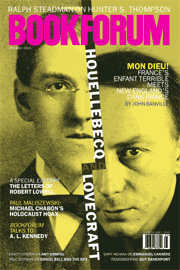
In 1999 the Chilean-born Roberto Bolaño won, to the surprise of many, the coveted Premio Rómulo Gallegos (an award often considered to be the Nobel of the Americas) for his extraordinary novel Los detectives salvajes——a well-deserved recognition. For most of his writing life he had remained relatively unknown, although those who did read his work (six novels, two short story collections, and two volumes of poetry, up to that point) were passionate in their devotion. After years of deprivation and hardship, including a long period spent in political exile from General Augusto Pinochet’s military dictatorship, Bolaño found himself being celebrated as the best Latin American writer of his generation. Then, just five years later, he died in Spain at the age of fifty.
Bolano’s 2000 novel, By Night in Chile—— a chilling deathbed confession by an Opus Dei priest and literary critic——became, in 2003, his first to be translated into English. Like that novel, Distant Star cunningly turns to the literary sphere to portray, with disarming humor, the inevitable and sometimes gruesome collision (and collusion) of literature, history, and politics. Superbly translated by Chris Andrews, the novel charts the tragic lives of several literatureobsessed friends and foes: Carlos Wieder, Bibiano O’Ryan, Juan Stein, Diego Soto, and an unnamed narrator. During the dark years under Pinochet (1973–90), we observe their destinies, fatally intertwined through a string of brutal events occurring in Chile’s poetry workshops, prisons, shoe stores, and brothels. The novel is far from merely a denunciatory account of the regime’s cruelty, however; it is a tragicomedy, one that echoes Borges in its erudite uncanniness. If Borges revealed how much literature goes into the making of the world, Bolaño reminds us how much politics go into the making of literature.
Wieder, the central character, is an autodidact and dandy: a Chilean air force pilot who skywrites poetry; a cameraman for porn films; an assassin who serially murders (mostly) women poets; and, most important, the founder——and sole member——of the so-called New Chilean poetry movement. Meanwhile O’Ryan, the narrator’s best friend——who is a clerk at a shoe store but also a poet with literary ambitions of his own (writing fables set in rural Ireland and editing a compendium of Nazi literature in America)——secretly records the successes of Wieder’s murder spree, tracing out the tangled history of Stein, Soto, and Wieder along with the history of Chile itself.
Stein, the narrator’s literary mentor, is a Chilean Jew who turns into a peripatetic guerrilla, turning up “wherever there was fighting, wherever desperate, generous, mad, courageous, despicable Latin Americans were destroying, rebuilding . . . in a final bid that was doomed to failure.” According to O’Ryan, Stein dies in San Salvador. The contrasting story of Soto, Stein’s rival, friend, and suggested double, is equally exemplary. After the coup that brings Pinochet to power, Soto leaves Chile for Paris. There he settles with his wife and children into the life of the blessed bourgeoisie, only to meet an absurd end in the Perpignan train station, at the hands of neo-Nazis. Bolaño seems to suggest that art does not imitate life; rather, art wants to escape life, but life comes savagely chasing after it.
Reality also bears in upon the aloof unnamed narrator, who has been following Wieder’s sporadic and ghoulish appearances through the letters sent by his friend O’Ryan. When O’Ryan writes to inform him of Soto’s death (the narrator receives the letter while in the hospital being treated for a liver ailment), he cannot help but be reminded of the story of Lorenzo, a Chilean boy who lost both arms after receiving an electric shock while climbing a hightension pylon. As the narrator experiences a sort of epiphany about Chile’s tragic history, Bolaño displays his gift for darkly revealing and incisive humor (a trait typically absent from fictional accounts of Latin American reality): “So Lorenzo grew up in Chile without arms, an unfortunate situation for any child, but he also grew up in Pinochet’s Chile, which turned unfortunate situations into desperate ones, on top of which he soon discovered that he was homosexual, which made his already desperate situation inconceivable and indescribable. Given these circumstances, it is not surprising that Lorenzo became an artist. (What else could he do?)”
After a failed suicide attempt, Lorenzo becomes an exiled painter and a street performer in Holland. His pathetic story serves as a metaphor for his nation’s struggle for survival: “Sometimes, when I think of Stein and Soto, I can’t help thinking of Lorenzo too. Sometimes I think he was the best poet of the three. But usually I see them all together. Although the only thing they had in common was having been born in Chile.” O’Ryan’s letters keep on coming, charged mostly with trivia, though sometimes containing crucial conjectures about the legend that Wieder——pilot, poet, assassin——has become since disappearing from the Chilean literary scene. The scenarios that O’Ryan concocts in his letters are far more exotic than the reality: According to one, in a startling turn of events the narrator, many years later, finds a lonesome Wieder in a cafeteria in a remote Spanish town——forgotten, obese, and prematurely aged, drinking coffee, smoking, and staring out to sea, as if he were just another anonymous man without an appalling past.
Bolaño’s prose marries humor and irony, violence and love, poetry and death. In several essays, Borges recast Hamlet’s final words: And all the rest is literature. A good disciple (and therefore a rebel), Bolaño arrived at his own interpretation, one that is more pertinent to the tragic destiny of his beloved Chile (and, indeed, much of Latin America): And all the rest is laughter.
Aura Estrada is the author of Borges, Inglés (Editorial Scripta, 2004).
